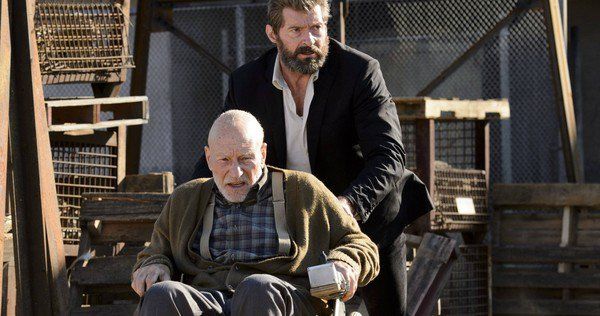Post-Traumatic Stress Disorder
Psychology of "Logan"
Political tyranny, immigration, and the fight for survival
Posted March 12, 2017

As a big X-Man fan, I was especially excited to see "Logan," the conclusion of the "Wolverine" movies on the big screen. The movie does not disappoint and has, in my opinion, heavy psychological and political themes.
Warning: Spoilers for the movie to follow.
The movie opens with a dystopian future for the X-Men. Very few of them remain, their powers dwindling as they are aging and dying. Logan (Wolverine) now spends most of his time working as a chauffeur while taking care of Professor Charles Xavier, founder of the Xavier School for Gifted Youngsters. Xavier's own health is giving out, as he continues to suffer from seizures, as well as dementia-like symptoms. Logan and a fellow mutant, Caliban, take care of Xavier, in managing his meds and symptoms.
Although nearing the end of his life, Professor X can still use some of his empathic abilities, some for better (to save horses from being run over on the freeway, for example) and some for worse. We learn later that Professor X actually caused severe destruction through his seizures where hundreds of innocent people, including some of his own X-Men were killed.
Xavier does not seem to remember this incident until much later in the film but Logan remembers it and he does not seem to be coping well. Specifically, Logan appears to have given up on life. He drinks heavily, he is constantly angry, he does not seem to care about his own wellbeing or that of others, he does not want to talk about the mutants, nor does he want to entertain the possibility of there being other mutants around, he suffers from nightmares and apparent fight-or-flight symptoms. In short, Logan's symptoms are consistent with posttraumatic stress disorder (PTSD), as well as possible Alcohol Use Disorder.
Logan's life does a 180 when he meets a woman (Gabriela), who begs him to protect a young girl (Laura) and bring her to a Canadian border. Logan learns that Laura was one of the many children who were experimented on in Mexico and, as a result, have developed genetic mutations. Laura's mutations are in fact identical to Logan's (retractable claws and self-healing). Although he does not want to believe it, Laura is in fact, Logan's daughter, one who makes a keen observation that Logan is dying, as if something is poisoning him from the inside. I wonder if it is his own survivor guilt, his trauma, possible depression, or his addiction, but Laura seems to be on point.
Things go awry when Donald Pierce, an evil narcissistic cyborg, devoid of human empathy, tries to control and use all mutant children that were developed in the laboratory in Mexico for his own purposes. Armed with his body guards/cronies, the Reavers, Donald tries to capture all the children before they can get across the Canadian boarder. The children, on the other hand, just want to be able to cross the boarder so that they can get to Eden, where they believe they will be safe, away from the war and prejudice.
Despite Logan's protests, Xavier manages to convince Logan to assure Laura's safety. Over the course of the film both Logan and Xavier are put in situations where their powers should be dwindling. For example, being subjected to a life-threatening situation, a rapid change of scenery, being chased by homicidal cyborgs and Reavers does not make for the most stable environment for someone struggling with dementia. And yet, ever since meeting Laura, Xavier appears to think more clearly. He appears to be reconnected with his sense of purpose all the way to the end.
The same seems to apply to Logan. After helping Laura find other child mutants, he learns that the children are being tracked by the Reavers. Logan injects himself with a powerful serum to make himself stronger and more immune to injury. However, the serum quickly wears off, leaving Logan weaker than he was before he took it (crash effect). However, when his daughter's life is in danger, the serum withdrawal does not stop Logan from fighting with full force.
The movie does a powerful job of reminding us that no matter how difficult life gets, no matter the trauma we have been through, we might be able to find strength in finding meaning. Because love trumps hate and I hope Donald will always remember that.
Dr. Janina Scarlet is a Licensed Clinical Psychologist, a scientist, and a full-time geek. A Ukrainian-born refugee, she survived Chernobyl radiation and persecution. She immigrated to the United States at the age of 12 with her family and later, inspired by the X-Men, developed Superhero Therapy to help patients with anxiety, depression, and PTSD. Her book, “Superhero Therapy” came out on December 1, 2016 in the U.K. and will release on August 1, 2017 in the U.S.
If you would like to learn more about Superhero Therapy, contact Dr. Janina Scarlet Twitter @shadowquill, Facebook: https://www.facebook.com/Shadow.Scarletl, or website at www.superhero-therapy.com
References
Owens, G. P., Steger, M. F., Whitesell, A. A., & Herrera, C. J. (2009). Posttraumatic stress disorder, guilt, depression, and meaning of life among military veterans. Journal of Traumatic Stress, 22(6), 654-657.


